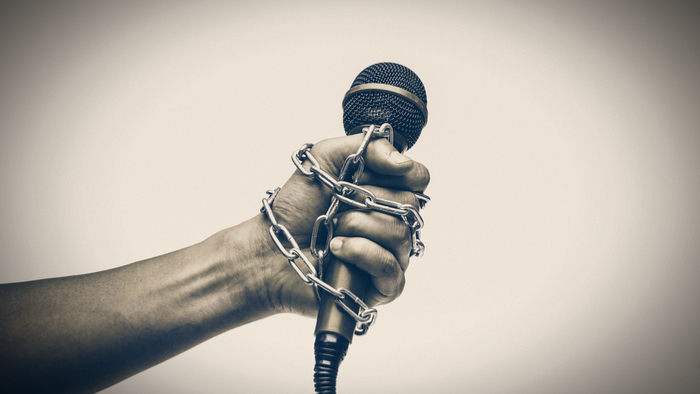
Audio By Carbonatix
Imagine waking up one morning, tuning into your favorite radio station, only to hear a monotonous beeping sound. The station is eerily off-air. Frustrated, you switch on your TV, hoping to catch up on the day’s news, only to be greeted by a blank screen—either the ants-like static of analogue TV or the cold, unscrambled "unavailable" message on digital.
You’d feel disoriented, wouldn’t you? That creeping sense of unease stems from being cut off from the lifeline that connects us to the world—the media.
It’s a nightmare scenario, yet recent developments from Ghana’s Electoral Commission (EC) risk edging us dangerously close to it. With December’s general elections looming, the EC’s decision to impose quotas on media accreditation at collation centers has raised alarms within the media fraternity and among the public.
In its recent press release, the EC acknowledged the concerns raised by media organizations about the restrictions. While emphasizing its commitment to transparency, the Commission pointed to the need for an “orderly and peaceful process” at collation centers, which it claims justifies the quotas on media access.
It assured stakeholders that discussions are underway with the Ghana Journalists Association (GJA) and the Ghana Independent Broadcasters Association (GIBA) to find an acceptable arrangement.
On the surface, this might appear as a reasonable move to maintain order. But when you peel back the layers, it becomes evident that limiting media access—however diplomatically packaged—is an affront to press freedom and, by extension, democracy.
Collation centers are not just bureaucratic hubs—they are the heartbeat of the electoral process. It is where raw votes are transformed into the official results that determine the future of our nation. Restricting media access at such a crucial stage risks creating an information vacuum.
Here’s why the quota system is problematic:
- Transparency Suffers: The fewer journalists present, the harder it becomes to independently verify the process. Transparency thrives on scrutiny, and the presence of diverse media outlets ensures that no single narrative dominates.
- Public Trust Wavers: Elections are not just about casting votes; they’re about believing in the system. Restricting media access breeds suspicion, creating fertile ground for rumors and misinformation.
- A Constitutional Breach: Ghana’s 1992 Constitution guarantees the media’s right to information. Limiting access undermines this right, which is critical in ensuring accountability and public confidence in the electoral process.
The EC’s concern for order and peaceful collation processes is valid. No one wants chaotic scenes that disrupt the tallying of results. But order and transparency are not mutually exclusive. The EC must adopt strategies that ensure smooth operations without curbing the media’s ability to perform its role.
The EC can:
- Expand Accreditation Slots: Rather than limiting access outright, the EC could increase accreditation slots while implementing rotational access to avoid overcrowding.
- Leverage Technology: Set up live-streaming services at collation centers that all accredited media houses can access remotely, reducing the need for physical presence.
- Develop Clear Guidelines: Work with media associations to establish protocols for reporting at collation centers to avoid interference with official processes.
At its core, this issue isn’t just about media houses—it’s about every Ghanaian. The media is the public’s watchdog, ensuring that elections are conducted fairly and transparently. When their access is restricted, it’s not just their rights that are trampled—it’s ours.
Imagine an election night where results trickle out in whispers, unverified and speculative. Imagine the tension that misinformation could breed, all because journalists were barred from providing accurate, timely updates. That’s the danger we face if we don’t protect media freedom.
The EC has assured the public of its commitment to transparency. But actions speak louder than words. Engaging with GJA and GIBA is a step in the right direction, but the outcome of these discussions must reflect the principles of openness and accountability.
As citizens, we must also demand better. The media is our lifeline in this democratic process, and their ability to operate freely should be non-negotiable.
Because when the media is silenced, democracy suffocates. And Ghana, a nation that has prided itself on its democratic credentials, cannot afford to let that happen.
Latest Stories
-
Adom FM’s ‘Strictly Highlife’ lights up La Palm with rhythm and nostalgia in unforgettable experience
2 hours -
Ghana is rising again – Mahama declares
5 hours -
Firefighters subdue blaze at Accra’s Tudu, officials warn of busy fire season ahead
6 hours -
Luv FM’s Family Party In The Park ends in grand style at Rattray park
6 hours -
Mahama targets digital schools, universal healthcare, and food self-sufficiency in 2026
6 hours -
Ghana’s global image boosted by our world-acclaimed reset agenda – Mahama
6 hours -
Full text: Mahama’s New Year message to the nation
6 hours -
The foundation is laid; now we accelerate and expand in 2026 – Mahama
7 hours -
There is no NPP, CPP nor NDC Ghana, only one Ghana – Mahama
7 hours -
Eduwatch praises education financing gains but warns delays, teacher gaps could derail reforms
7 hours -
Kusaal Wikimedians take local language online in 14-day digital campaign
8 hours -
Stop interfering in each other’s roles – Bole-Bamboi MP appeals to traditional rulers for peace
8 hours -
Playback: President Mahama addresses the nation in New Year message
9 hours -
Industrial and Commercial Workers’ Union call for strong work ethics, economic participation in 2026 new year message
10 hours -
Crossover Joy: Churches in Ghana welcome 2026 with fire and faith
11 hours

